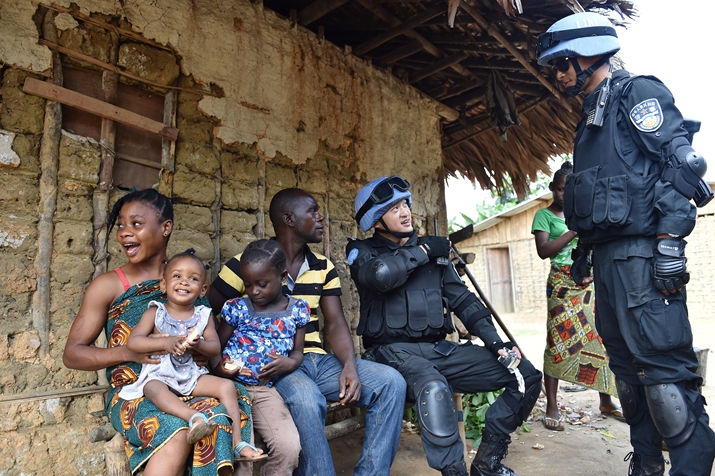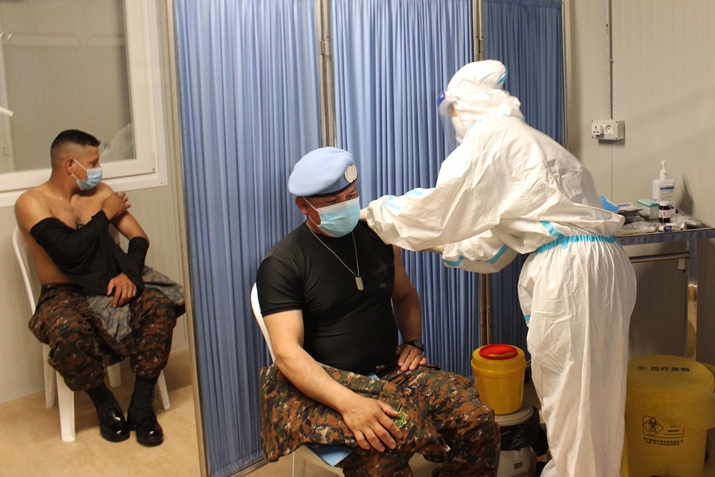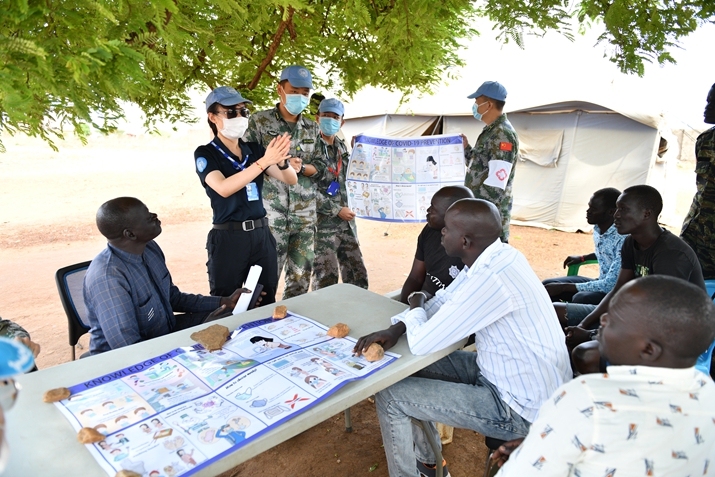| China |
| Chinese blue helmets instill positive energy in world peace and development | |
|
|
 Chinese peacekeeping police officers learn about the local security situation in a village in Liberia on November 3, 2015 (XINHUA)
"Wearing the blue helmet makes you feel like a heavyweight in the pursuit and support of peace," He Yongxue, a battalion commander in the Chinese People's Liberation Army (PLA), told Beijing-based PLA Daily. Selected as a member of the new peacekeeping infantry battalion to South Sudan, he needs to switch roles and throw himself into the intense training schedule before leaving China to embark on his new mission. He participated in the Shared Destiny-2021 UN peacekeeping field training exercise from September 6 to 15. This is the first-ever such event to be organized by the Chinese military, and also the first multilateral drill to assess the achievements of China's peacekeeping standby force. Joint events like Shared Destiny-2021 are important as a means of improving UN peacekeeping capabilities as well as its talent pool. China's armed forces have thus far conducted various peacekeeping exercises and training programs together with the UN, other countries and regional organizations. Over the past three decades, China's armed forces have dispatched about 50,000 peacekeepers to 25 UN peacekeeping missions. Currently, a total of 2,241 Chinese peacekeepers are serving at the UN headquarters in New York, U.S., as well as across seven mission areas. Among the five permanent members of the UN Security Council, China has become the second largest contributor to the UN peacekeeping budget and the largest supplier of troops to UN peacekeeping operations. "This has been a great achievement and an inspiration for many developing countries," Kim Won Soo, former Under Secretary General of the UN, wrote in China Daily. A rock The blue helmet, marked with the letters UN in clear white, is the symbol of UN peacekeepers. The background color of the UN flag shines bright and guides them in contributing to world peace. "China has played an active role in enhancing world order, promoting multilateralism, and tackling key global challenges," Khuon Sodary, Second Vice President of the Cambodian National Assembly and a member of the Standing Committee of the Cambodian People's Party, told Xinhua News Agency. The country has sent its peacekeepers to join operations in war-torn countries, which "underline the noble and historic role of China and its people in assisting countries around the world to achieve long-term peace, stability and development," she added. Over the years, Chinese military peacekeepers have left their footprints in over 20 countries and regions, including Liberia, Lebanon, the Democratic Republic of the Congo (DRC), South Sudan and Mali. According to a white paper released by the State Council Information Office in September 2020, Chinese peacekeepers have made tremendous contributions to facilitating the peaceful settlement of disputes, safeguarding regional security and stability, and promoting economic and social development in host nations. The PLA dispatched a 700-strong infantry battalion to the UN Mission in South Sudan (UNMISS) in 2015, the first organic unit of its kind to operate overseas in a peacekeeping mission. Over the past six years, seven rotations of the Chinese infantrymen have taken place in the UNMISS. They worked day and night amid the rattle of gunfire and the rumble of explosions in the area. As of August 2020, the battalions had completed 51 long-range and 93 short-distance patrols, 314 armed escorts, and over 30,000 hours of patrols in weapon-free zones, significantly aiding the stabilization of the local situation, according to the white paper. Mali is among the most dangerous mission areas, afflicted by frequent suicide attacks, roadside bombings and other terrorist assaults. In December 2013, China dispatched a unit of 170 troops to the UN Multidimensional Integrated Stabilization Mission in Mali (MINUSMA) to conduct on-guard duties and VIP protection. This was the first time China's armed forces had dispatched troops to carry out force protection. As of 2020, China had sent 1,440 troops, in eight rotations, to MINUSMA to serve the purpose. The majority of Chinese peacekeeping troops now perform enabling tasks. Force enablers such as engineer, transport, medical, and helicopter units play an irreplaceable role in ongoing operations. In May 2020, despite the ongoing COVID-19 pandemic, the Chinese engineer unit constructed a bridge over the Sopo River in South Sudan, effectively establishing a topnotch transport route between the cities of Wau and Raga. The Chinese standby force has provided sturdy support for UN peacekeeping missions, UN Military Adviser for Peacekeeping Operations Carlos Humberto Loitey said in an interview with Xinhua News Agency in 2019, describing China's dutiful sense of mission in peacekeeping as admirable.  Chinese medical peacekeepers administer the COVID-19 vaccine to members of the UN Interim Force in Lebanon at a base camp on June 2 (XINHUA)
Teamwork In 2015, President Xi Jinping attended the Leaders' Summit on Peacekeeping at the UN headquarters and presented several proposals stating that the basic principles of peacekeeping must be strictly followed, the peacekeeping system needs an upgrade, the rapid response capacity needs improvement and greater support and help must go to Africa. Xi also announced that China would provide military aid worth $100 million to the African Union to back the development of the African Standby Force and the African Capacity for Immediate Response to Crisis in the following five years. The country has strengthened communication with UN agencies, attended sessions of the UN Peacekeeping Defense Ministerial and the UN Chiefs of Defense Conference and promoted peacekeeping cooperation, the white paper further read. Wearing their dark green camouflage uniforms, Chinese peacekeepers always bear in mind the responsibilities they share and the country they represent. Cai Hui, an associate professor with the National University of Defense Technology and a senior instructor at the Peacekeeping Affairs Center under the Ministry of National Defense, said Chinese peacekeepers have a clean disciplinary record. "We, the Chinese, have followed and upheld this respectable tradition in consistent manner." China has cooperated on peacekeeping with over 90 countries and 10 international and regional organizations. In 2015, it conducted the first BRICS consultation on the UN peacekeeping operations with Brazil, Russia, India and South Africa. In April 2018, military advisers of Russia, France, the UK and the U.S. to the UN Military Staff Committee visited China. China's armed forces have managed to enhance mutual understanding, shared experiences, extended practical teamwork, reinforced bilateral and multilateral relations, and promoted peacekeeping capabilities through various visits, expert discussions, joint exercises and personnel training programs, according to the white paper. Chinese peacekeepers have participated in multilateral engagements such as the Khan Quest multinational peacekeeping exercises in Mongolia from 2015 to 2019 and the multinational computer-assisted command post exercise, Viking 18, in Brazil back in April 2018. They have also been involved in consultations and policy-making discussions, and provided input on the peacekeeping operations. For example, expert meetings have been hosted by China to draft and review a number of official UN documents, including the UN Peacekeeping Missions Military Engineer Unit Manual and the Military Peacekeeping-Intelligence Handbook.  Chinese peacekeepers explain the knowhow of COVID-19 prevention to residents in Juba, South Sudan, in March 2020 (XINHUA)
Seeds of hope Chinese peacekeepers are not only guardians of peace, but also messengers of friendship. The Chinese medical units in the DRC ran an associated project in the SOS Children's Village of Bukavu, close to the Rwandan border, to offer help. Touched by their love and care, children in the village referred to the female staff members as their Chinese mothers. In the UNMISS, the blue helmets provided locals with agricultural techniques, farming tools and vegetable seeds. They were invited by local middle schools to teach students about Chinese culture and language, topics that proved very popular with the children. The red Chinese flag has proudly bore witness to their consistent efforts. Nevertheless, and more eerily so, red is also the color of blood. In July 2016, an armed conflict between government and opposition forces broke out in Juba, South Sudan, paired with widespread sexual violence against women and young girls. Heavy weaponry, including tanks, large-caliber artillery, and armed helicopters, was employed by both sides in a fierce exchange of fire, endangering the lives of innocent civilians. The Chinese infantry battalion and other peacekeepers acted in the protection of civilians in downtown Juba and over 100 surrounding villages. Caught in a raging storm of gunfire and artillery, the Chinese infantrymen risked their lives to establish a defensive line and ensure the safety of over 9,000 civilians. Two peacekeepers, Li Lei and Yang Shupeng, lost their lives in action. A total of 20 Chinese men and women in uniform have laid down their lives in UN peacekeeping operations, according to UN data. In 2010, He Zhihong, a peacekeeping policewoman on a UN peacekeeping mission in Haiti passed away in an earthquake. She once wrote, "In this vast world, I may just be like a small feather. But even so, I want this feather to carry the hopes for peace." While the blue helmets are protecting the world, China is committed to protecting them, Zhang Jun, China's permanent representative to the UN, said in a video message on the International Day of UN Peacekeepers on May 29. Upon China's initiative, the UN Security Council adopted its first resolution on the safety and security of peacekeepers in 2020. In April, China also launched the Group of Friends on the Safety and Security of UN Peacekeepers initiative, which brings together 49 countries and regional organizations and aims to provide a platform to support related efforts, including information sharing, policy coordination and capacity building. Peacekeepers continue to operate in complex environments while issues related to safety, such as vehicle accidents and illnesses, can affect their overall ability to deliver on their mandated tasks, UN Under Secretary General for Peace Operations Jean-Pierre Lacroix said in May. The impact COVID-19 has had on safety, including occupational health, also continues to be a major concern, he added. On September 22, a shipment of China's Sinopharm COVID-19 vaccines arrived in Copenhagen, Denmark, as a donation to UN peacekeeping personnel on behalf of the Chinese Government. The vaccines are expected to be distributed to frontline personnel and close partners through the UN system and be used across the mission areas in Africa on a priority basis. China will continue to honor its commitment to support the UN and protect its peacekeepers through concrete action, Zhang said. (Print Edition Title: The Tricolor of Peacekeeping) Copyedited by Elsbeth van Paridon Comments to mamm@bjreview.com |
|
||||||||||||||||||||||||||||||
|
